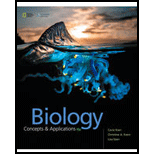
Concept explainers
The number of species on an island usually depends on the size of the island and its distance from a mainland. This statement would most likely be made by _______.
| a. an explorer | c. a geologist |
| b. a biogeographer | d. a philosopher |
Introduction:
The branch of science that deals with the study of the relationship between the organisms with their geography are known as biogeography. A biogeographer tries to understand the development, evolution, and prevalence of organisms based on their environment.
Answer to Problem 1SA
Correct answer:
The study of the organisms with respect to their environment and its impact on its evolution and development is called biogeography. The number of species in an area with respect to the “size of the area” will be studied by a biogeographer. Hence, the correct answer is option b.
Explanation of Solution
Reason for correct answer:
Option b. is given as “biogeographer.”
A biogeographer establishes the relationship between the species and their prevalence based on the geographical location and rate of evolution depending on its environment.
Reason for incorrect answer:
Option a. is given as, “an explorer.”
Explorer voyages around different parts of the world to discover what has not been found or explored. Hence, option a. is incorrect.
Option c. is given as, “a geologist.”
A geologist studies the patterns of the soil and rocks of Earth. Hence, option c. is incorrect.
Option d. is given as, “a philosopher.”
A philosopher is concerned about the fundamental issues like knowledge, matter, values, benefits, reasons and so on. Hence, option d. is incorrect.
Hence, the options a., c., and d. are incorrect.
The number of species in a geographical location like the island, its dependence on the size of the island and its distance from the mainland can be evaluated by a biogeographer. Thus, the correct option is b.
Want to see more full solutions like this?
Chapter 16 Solutions
BIOLOGY:CONCEPTS+APPL.(LOOSELEAF)
- Which two extinction risks may be a direct result of the pet trade? a. climate change and exotic species introduction b. habitat loss and overharvesting c. overharvesting and exotic species introduction d. habitat loss and climate changearrow_forwardA species which are facing extremely high risk of extinction in immediate future is called as?arrow_forwardA creek provides habitat and breeding sites for several different amphibian species. Which scale of life represents the interactions between the amphibians and the creek? a. population b. biome c. ecosystem d. community aarrow_forward
- Populationecologists do not study:a.reproductive ecology.b.distribution and abundance.c.energy flow.d.extinction.e.adaptation.arrow_forwardStudies of preagricultural populations indicate that compared to people today, Paleolithic people ate a. food that contained more fat and less fiber. b. food that had fewer essential nutrients. c. mostly meat. d. a wider variety of food.arrow_forwardWhich term describes the process whereby toxic substances increase along trophic levels of an ecosystem? a. biomassification b. biomagnification c. bioentropy d. heterotrophyarrow_forward
- A researcher wanted to know if introduced predators (lake trout, a fish) caused a decrease in the abundance of yellow-legged frogs. The ecologist measured the density of frogs (number frogs per meter of shoreline of a lake) in lakes that did not have any introduced predators (fish absent), lakes that had previously introduced predators (fish present), and lakes from which he removed the predators (fish removed), and then recorded if frog density increased, decreased, or stayed the same over one year. part a: What was the role in the experiment of the “fish present” lakes? Group of answer choices A. subjects B. experimental group C. positive control group D. negative control group E. standardized condition part b: This study focused primarily on ______________ ecology. Group of answer choices A. organismal B. population C. community D. physiological E. biospherearrow_forwardSecondary contact after divergence rarely results in? A. creation of a hybrid zone B. formation of a new species C. the rapid decline of both populations D. extinction of one populationarrow_forwardAnalyze if the following pairs of statements are correct. Choose: A, if both statements are correct; B, if only the first statement is correct; C, if only the second statement is correct; or D, if both statements are incorrect. 1a. Diversity describes the number of species and abundance of each species 1b. The higher the value of Simpsons’ index (D), the higher the species diversity.arrow_forward
- Based on the theory of island biogeography, how would you expect the species richness of birds on islands to compare with the richness of snakes and frogs? Explan your answer.arrow_forwardWhich of these contributed to humans beginning to abandon a hunter-gatherer lifestyle approximately 15,000 to 10,000 years ago? a)climate change b)extinction of large pray c)domesticating animals d)growing crops, resulting in increased food supply e)all of the abovearrow_forwardWhat might happen in desert if a species or several species became extinct or threatened?arrow_forward

 Biology Today and Tomorrow without Physiology (Mi...BiologyISBN:9781305117396Author:Cecie Starr, Christine Evers, Lisa StarrPublisher:Cengage Learning
Biology Today and Tomorrow without Physiology (Mi...BiologyISBN:9781305117396Author:Cecie Starr, Christine Evers, Lisa StarrPublisher:Cengage Learning Concepts of BiologyBiologyISBN:9781938168116Author:Samantha Fowler, Rebecca Roush, James WisePublisher:OpenStax College
Concepts of BiologyBiologyISBN:9781938168116Author:Samantha Fowler, Rebecca Roush, James WisePublisher:OpenStax College


